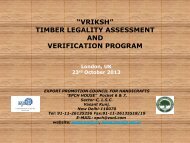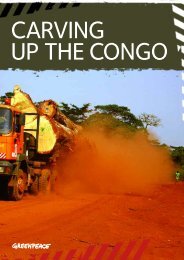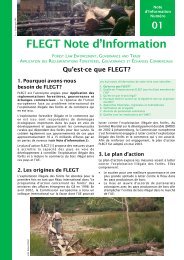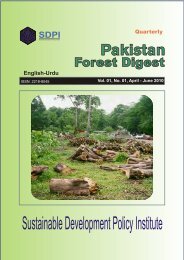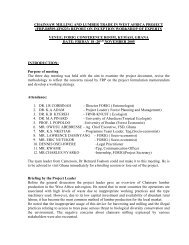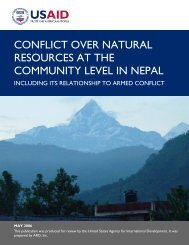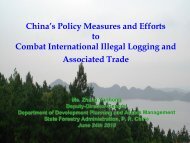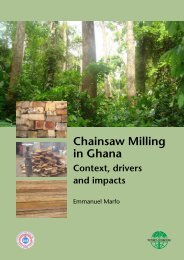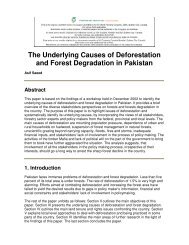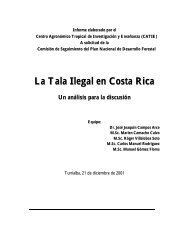download document - Rights and Resources Initiative
download document - Rights and Resources Initiative
download document - Rights and Resources Initiative
- No tags were found...
Create successful ePaper yourself
Turn your PDF publications into a flip-book with our unique Google optimized e-Paper software.
Historical <strong>and</strong> contemporary l<strong>and</strong> laws <strong>and</strong> their impact on indigenous peoples’ l<strong>and</strong> rights in Ug<strong>and</strong>a:The case of the Batwathe Batwa in 2000. 94 Even then, not all evicted Batwa got part of this l<strong>and</strong>, since a total of only326 acres was bought. The farmers who destroyed the forest l<strong>and</strong>s in the 1930s to establishfarms received recognition of their ‘l<strong>and</strong> rights’, <strong>and</strong> many of them received compensation. 95The L<strong>and</strong> Acquisition Act requires involvement in the acquisition process of the communitylikely to be affected by compulsory acquisition. No such forum has been provided to the Batwato organise <strong>and</strong> present their objections. Their interests have not been considered, despite theexpress <strong>and</strong> instructive provision calling for compensation of the deprived interest throughcompulsory acquisition.The Government’s actions through its agents have thus contravened the Constitution <strong>and</strong> theL<strong>and</strong> Acquisition Act <strong>and</strong> have been prejudicial to the Batwa. Fortunately, Article 26 (2) (b) (ii)provides for the right of access to a court of law by any person who has an interest in or right toproperty. This gives the Batwa a forum for redress. The Batwa, however, have lacked thecapacity or legal representation to access the courts to claim their rights.4.1.1.5 The L<strong>and</strong> Act 1998 96The Act was intended to implement the provisions under the 1995 Constitution.L<strong>and</strong> tenure systems <strong>and</strong> the BatwaFollowing the Constitution, section 2 of the L<strong>and</strong> Act recognises three l<strong>and</strong> tenure systems <strong>and</strong>provides for their incidents (rights accruing to a particular tenure system). However, thenotions underlying the freehold, mailo <strong>and</strong> leasehold tenure systems leave the Batwa in aprecarious situation. First, the pre-requisite of owning l<strong>and</strong> under the freehold <strong>and</strong> mailotenures is registration, <strong>and</strong> the presupposition here is individual l<strong>and</strong> ownership, a practice nottraditional to the Batwa, whose tenure on l<strong>and</strong> has always been customary. After their eviction<strong>and</strong> without evidence of title, the Batwa can only be squatters on the l<strong>and</strong> owned by othersunder any of the above tenure systems.Customary tenure – section 3 (1) of the Act – is governed <strong>and</strong> regulated by a group’s customaryrules <strong>and</strong> norms. In essence, customary law regulates the use of such l<strong>and</strong> which is mainlycommunal, based on clans, with individual usufruct rights over some specific parcels of thel<strong>and</strong>. The Act provides that such customary l<strong>and</strong> is owned in perpetuity. The Batwacommunally held their l<strong>and</strong>, governed by their customary law. Lewis puts it succinctly: ‘ManyBatwa communities conceive of their rights over l<strong>and</strong> in terms of collective rights, often clanrights rather than individual title. This is especially true of forest dwelling Batwa.’ 97Following Article 237 (4) (a) of the Constitution, Section 4 (1) of the L<strong>and</strong> Act provides that:‘Any person, families or community holding l<strong>and</strong> under customary tenure on former public94 Penninah <strong>and</strong> Kenrick (2002), pp 1–2.95 Lewis (2000), p 20. The author notes that some Batwa were turned away because the compensation fund hadbeen used up by payments to non-Batwa affected parties.96 At the time of writing, the L<strong>and</strong> Act had been amended twice, in 2002 <strong>and</strong> 2004. There was yet anothercontroversial L<strong>and</strong> Amendment Bill in 2008, which was shelved owing to lack of consensus on its contentfrom various sections of the public.97 Lewis (2000), p 17.Nakayi 20January 2009



